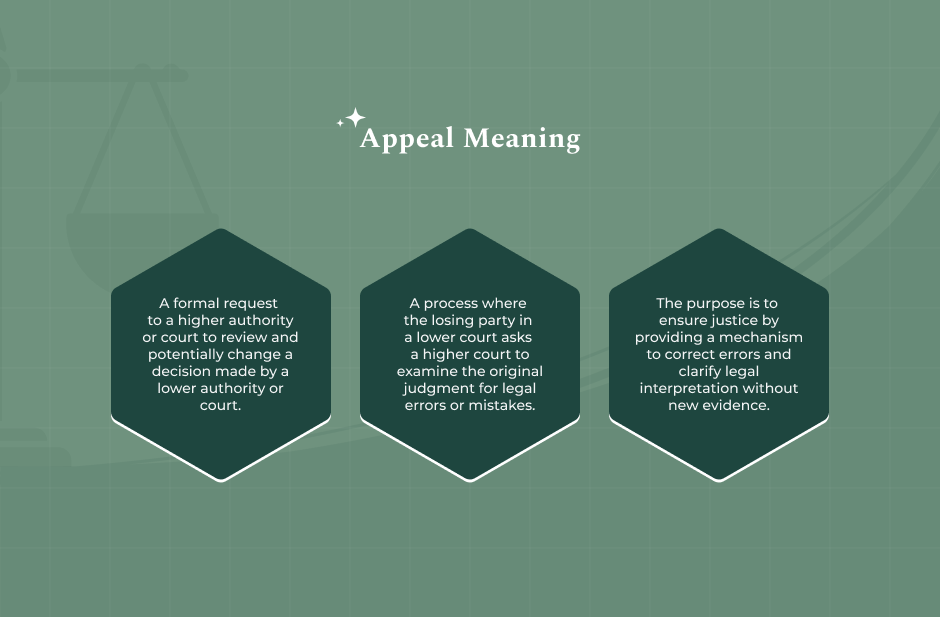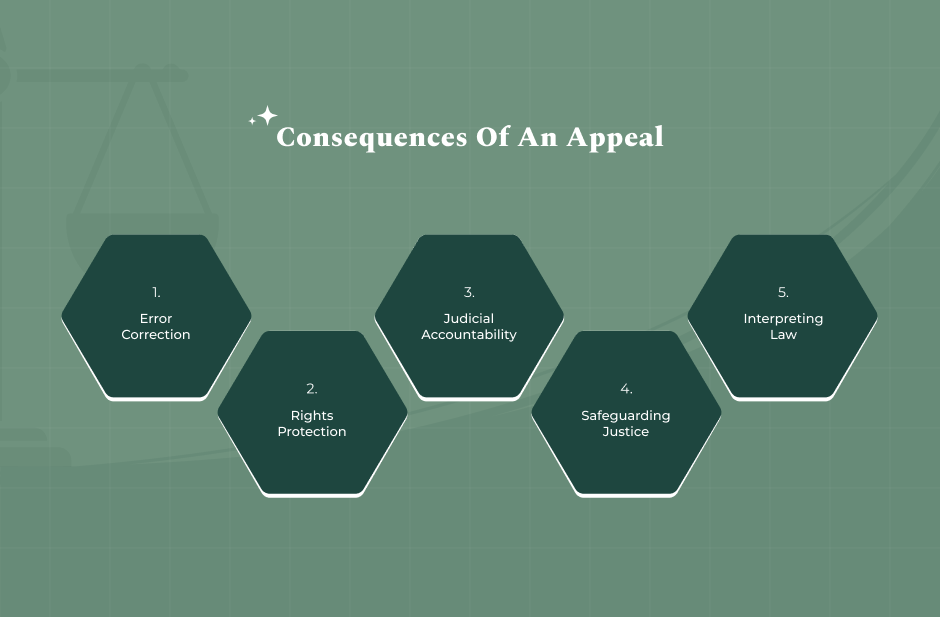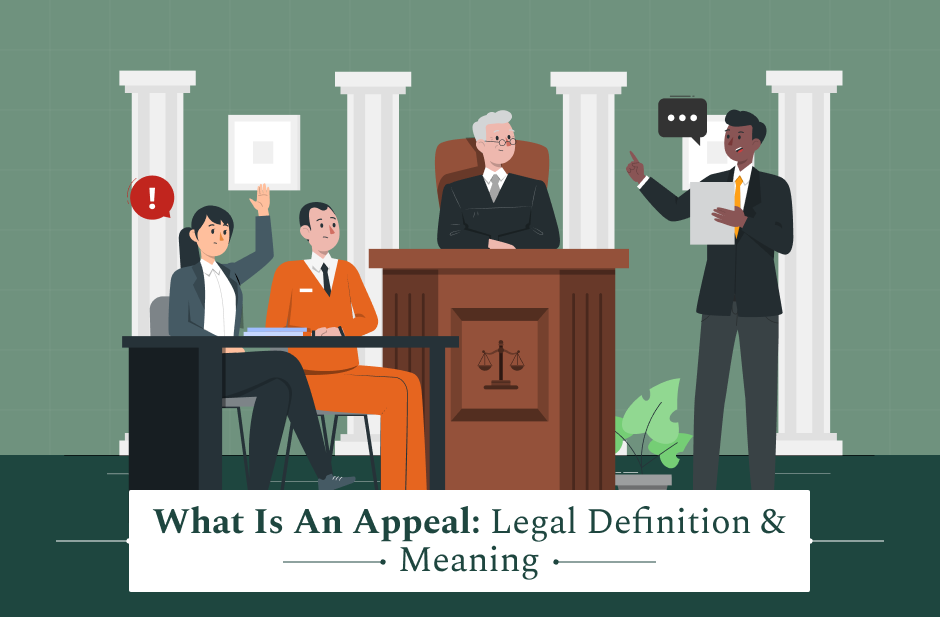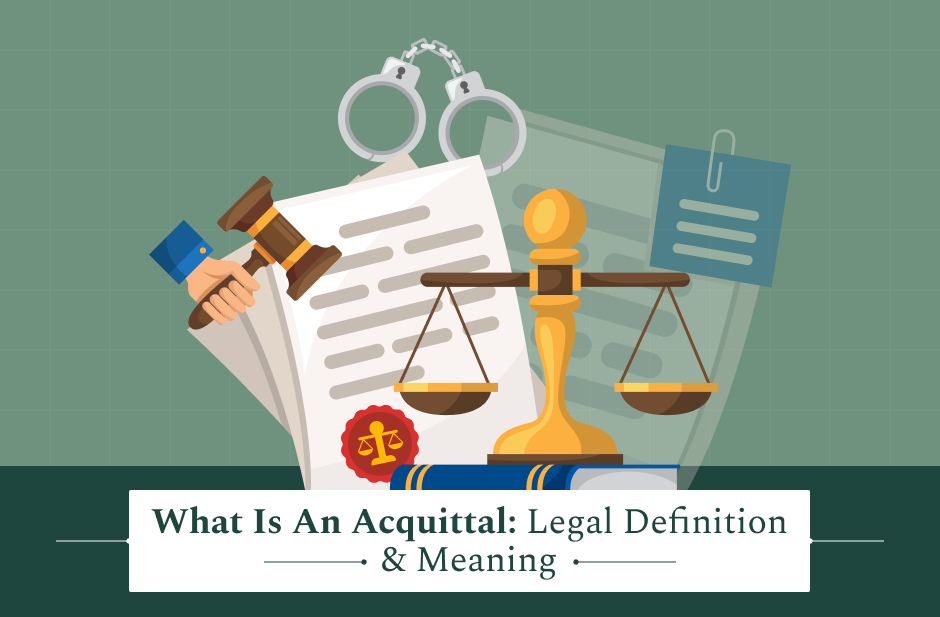When a party to a legal case is dissatisfied with a decision by a court of first instance (trial court or lower court), the legal system often provides a mechanism called an appeal.
Primarily, an appeal allows for review of that decision by a higher court. It is an essential feature of legal systems aiming at fairness, error correction, consistency in the application of law, and protection of rights.
In this article, I will talk about the following:
- What is an appeal?
- The different types of appeal.
- Key aspects of an appeal.
- What is the process of an appeal?
- What is the legal impact?
Additionally, I will also talk about some of the questions people also ask about when they are searching for the legal meaning of an appeal. So, if these are some of the things that you want to know, keep on reading this blog till the end…
What Is An Appeal?

An appeal is a legal process by which a party (the appellant) seeks to have a higher court (appellate court) review and change (or uphold) a decision made by a lower court (or tribunal).
In an appeal, the appellate court examines the record of the lower court proceedings. These generally include:
- Evidence.
- Transcripts.
- Pleadings.
According to the WomensLaw.org, this is in order to determine whether:
- There were any legal errors.
- The law was applied correctly.
- The procedure was fair.
- Significant issues of law or fact need correction.
Appeals are not retrials: new evidence is typically not allowed, witnesses are not re-examined, and the appellate court does not generally substitute its own factual findings unless those findings were clearly erroneous.
The American Bar Association states that the focus is on legal issues like:
- Interpretation of law.
- Application of the procedure.
- Possible constitutional or statutory errors.
What Are The Types Of An Appeal?
There are several categories/types of appeals, depending on jurisdiction, timing, scope, and rights. Some of the common types include:
1. Appeal Of Right Vs Discretionary Appeal
According to Legal Information Institute, “Appeals can be either discretionary or of right.” Here’s what you need to know about these two forms of appeals:
- Appeal of right: where a law or rule guarantees the losing party a right to have the decision reviewed by an appellate court.
- Discretionary appeal: where the appellate court has the discretion to decide whether or not to hear the appeal. Supreme Courts often have discretionary jurisdiction.
2. Final Judgment Vs Interlocutory Appeals
The other types include:
- Final judgment appeals are made after final decisions in a case.
- Interlocutory appeals (or interim appeals) happen before the full resolution of a case. For example, in order to resolve specific legal questions that will significantly affect the rest of the case. Many jurisdictions restrict interlocutory appeals unless certain criteria are met.
3. Civil Appeals Vs Criminal Appeals
Appeals can also depend on the type of cases that you are dealing with. For instance, according to the ABA, here’s what you need to know
- Appeals in civil cases often involve disputes between private parties (contracts, torts, property, etc.).
- Criminal appeals come when someone convicted (or sentenced) seeks review: e.g., errors in trial, in sentencing, or constitutional issues.
4. Administrative / Agency Appeals
As per the official documents from the U.S. Courts, decisions of government agencies or tribunals may be appealed, either within the agency system or to a court. These appeals often require specialized procedure.
5. Special / Extraordinary Appeals Or Leave To Appeal
Finally, according to the U.S. Courts, in some systems, a party must seek leave (permission) to appeal, or petition a higher court to review a lower court’s decision, especially when no automatic right of appeal exists.
Read Also: What Is An Allegation: Legal Definition & Meaning
What Are The Key Aspects Of An Appeal?
Several important features define appeals and distinguish them from first‐instance trials. Key aspects include:
- Record on Appeal
- Standard of Review
- Grounds for Appeal
- Timeline / Strict Deadlines
- Oral Argument vs Written Briefs
Possible Outcomes: According to the United States Courts, the appellate court may affirm (uphold) the lower decision, reverse (overturn), modify, remand for further proceedings, vacate, or dismiss the appeal if not properly filed or on other grounds.
How Does An Appeal Happen?
According to the California Courts of Appeal, there are several rules that the courts have to follow when it comes to an appeal. They “judge each appeal based on the same legal standards.”
While it is true that the specifics differ by jurisdiction, here is a typical process flow for an appeal:
- Decision / Judgment Issued: First, a final decision (or in certain cases, an interlocutory order) is issued by a lower court. That triggers possibilities for appeal.
- Notice of Appeal: The party wanting to appeal must file a notice of appeal within the time fixed by procedural law. This notice informs the court and opposing party of the intent to appeal.
- Preparation of the Record: Ensure transcripts, evidence, and filings from the trial court are collected and transmitted to the appellate court. The record on appeal is what appellate judges will review.
- Briefs Filed: The appellant files an opening brief: legal arguments, pointing out what errors were made, citing law, and precedents. Then the appellee responds in an answer/response brief. Usually, reply briefs are allowed.
- Oral Argument (if applicable): In many appellate courts, after briefs, there may be an oral argument where both sides present to judges and answer questions. Not all appeals have this stage.
- Decision by Appellate Court: Judges consider the record, the briefs, oral arguments (if any), apply standards of review, and then issue a written opinion or judgment. They may affirm, reverse, modify, remand, or dismiss.
Additional Step: Further Review
According to the United States Courts, in many legal systems, there may be an opportunity to seek further review by a higher court (Supreme Court), but often this is discretionary. Also, parties may seek motions for rehearing, or in some instances, extraordinary remedies (e.g, petition for certiorari).
What Are The Legal Impact Of An Appeal?

Now that you are aware of what is an appeal, you should know that appeals have significant legal and practical consequences. Some of them include:
Error Correction & Legal Precedent
One primary function is to correct mistakes made at trial: errors of law, procedural abuses, or misapplication of rules. The Legal Information Institute states that appellate opinions also generate precedent, contributing to uniformity in law.
Clarification / Development of Law
An appellate court, according to the US Courts website, is a court that reviews and interprets the statutes, the provisions of the Constitution, resolves doubts, may even change the legal doctrine, and thus influences later cases.
Safeguard of Rights
In the case of criminal defendants, appeals are a security fence preventing false imprisonment, biased trials, too hard or illegal punishments, and infringement of due process.
The American Bar Association notes that in civil lawsuits, appeals serve to protect the parties from wrongful judgments and legal errors that might lead to the deprivation of their rights.
Delay and Costs
Appeals consume time, resources, and legal fees. They also may delay enforcement of judgments, unless a stay is granted. This can have financial consequences.
Finality vs Opportunity for Redress
Appeals balance the value of finality (so disputes do not drag on indefinitely) with the need for a mechanism to correct wrongs. Courts often limit appeals to avoid abuse.
Impact on Parallel or Related Proceedings
Sometimes outcomes in appeals affect related cases, enforcement of judgments, or appeals in other jurisdictions. Also, appellate rulings may remand for retrial or further proceedings in the lower court.
Read Also: What Is An Alford Plea: Legal Definition & Meaning
Frequently Asked Questions (FAQs):
Here are some of the questions that most people who search for what an appeal is also ask. Take a look at them before you leave:
1. Is An Appeal A New Trial?
No. An appeal is not a new trial. The appellate court does not retry the case by hearing new evidence or new witnesses (except in rare or exceptional circumstances). It reviews the proceedings and record of the lower court, and assesses whether there were legal or procedural errors.
2. Who Has The Right To Appeal?
Usually, the party who is “aggrieved” by the decision of the lower court—that is, someone adversely affected. Depending on the law, some appeals are rights, some are conditional, and some require permission (leave). Additionally, in criminal law, certain verdicts or sentences may be appealed; in some cases, the government can also appeal under limited circumstances.
3. How Soon Must You File An Appeal?
There are strict time limitations (“statutes of limitation” for appeal), often starting from the date of the judgment or order you wish to appeal. Missing the deadline usually means you lose the right to appeal.
4. Can New Evidence Or Witnesses Be Introduced On Appeal?
Generally no. Appeals rely on the existing record from the trial or lower court. New evidence is rarely allowed. If new facts or evidence emerge, sometimes other remedies are possible (e.g., motion for new trial, or another kind of special petition), but not part of a standard appeal.
















